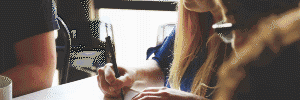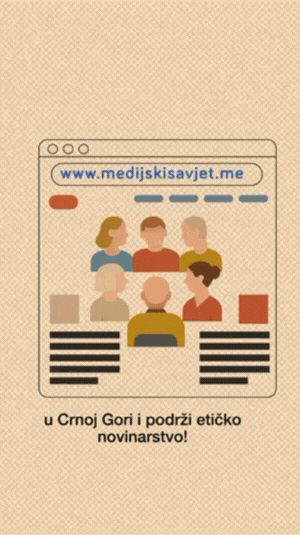Amid a global regression of democratic values, media freedom - once a pillar of healthy societies - appears to be at a historic low. Yesterday’s report from Reporters Without Borders shows that the global press freedom index is the lowest since this measurement began. And although Montenegro has formally recorded progress, it still faces a crisis of trust, security, and sustainability in the media sector.
Montenegrin journalists mark this May 3 - World Press Freedom Day - in an atmosphere of increasingly frequent threats, political pressure, and the erosion of the profession. Instead of recognition and support, they often receive insults, hate messages, and sometimes even fists.
In this context, World Press Freedom Day this year is yet another opportunity to point out how the environment in which journalists in Montenegro meet this date is permeated with uncertainty and all forms of violence.
On this occasion, Ranko Vujović, Executive Secretary of the Media Council for Self-Regulation (MSS), spoke to Portal Analitika about the causes of the degradation of the journalistic profession, as well as the measures necessary for journalism in Montenegro to survive - especially given today’s global challenges.
Media freedom and democracy in the greatest crisis in the last 80 years
“The overall situation and everything happening in the world do not work in favor of media freedom - neither here nor globally. I believe that major challenges await both the media and democracy worldwide. Right now, the far right and populists - who are in no way sympathetic to either the media or freedom of expression - are on the rise,” Vujović points out.
On the other hand, there are large technology companies that also do not want any regulation of the content posted on their platforms - content that is full of misinformation and hate speech.
“Social networks are slowly taking the lead in the information sphere, increasingly threatening the survival of traditional media. In short, it’s not just media freedom - rather, the entire democratic order established after World War II is in its greatest crisis in the last 80 years,” warns Vujović.
The rise of the right, led by the church, is not good news for the media
Turning to the domestic context, the MSS Executive Secretary points out that even without global upheavals, Montenegro carries its own burden of an unsettled environment for independent journalism.
“Montenegro, as a relatively young democracy, suffers from all these problems even without such a global context. We have no tradition of free and independent media, and politicians have never been ready - neither now nor before - to acknowledge the special position of the media as one of the pillars of every democratic society,” Vujović stresses.
He notes that the changes that took place in 2020 did not bring the expected democratization of society.
“On the contrary, the old practices continued, and in a large part of society, retrograde trends dominate - seriously endangering all that was achieved in the previous period. The right has also grown stronger here, led by the church, which is certainly not good news for anyone who supports basic freedoms and human rights - least of all for the media,” Vujović says.
The Reporters Without Borders 2025 World Press Freedom Index, published yesterday, only confirmed these worrying trends.
“Yes, Montenegro advanced by three places in the ranking, but the whole world has regressed. The index published yesterday is the lowest since this organization began such measurements. Global media freedom has fallen to its lowest level ever, according to the annual index of Reporters Without Borders,” notes Vujović.
Journalists unprotected, institutions and politicians fuel tensions
The increased number of attacks on journalists in Montenegro in recent years does not surprise Vujović. He sees the causes in a societal atmosphere in which violence against the media has become almost normalized - deeply rooted and linked to the broader social context.
“Many have understood that the so-called ‘liberation’ or ‘refreshment’ of 2020 means they can say and do whatever they want. Many believe their five minutes have come to settle scores with opponents or with journalists they don’t like. Let me remind you that since the early 1990s, the position of journalists in society has been in constant decline, and journalism has become one of the worst-paid professions,” Vujović points out.
He adds that humiliated and offended journalists - whom no one wants to protect or restore dignity to their profession - often become targets of various ‘free shooters’ or individuals who think they can freely attack them.
“This is how, for example, in 2022 more attacks on journalists were recorded than in the entire five-year period between 2016 and 2020,” notes the MSS Executive Secretary.
In such an environment, professional journalists remain unprotected, and institutions and politicians often contribute to escalating tensions.
“The lack of respect for journalists and their work, the lack of recognition of the profession, the disrespect of the media and what they represent - this is the reality for our media and journalists. The media are still seen as service tools for various power centers. And when they try to work independently, problems arise,” stresses Vujović.
Despite the negative trends, he sees some improvements in institutional response.
“It’s good that the Supreme State Prosecutor issued binding instructions for dealing with cases of attacks on journalists, and it’s good that the last few cases were resolved quickly and with severe penalties. These are encouraging steps, but we would also like to see politicians stop publicly insulting and attacking journalists,” Vujović says.
Protecting journalists and the public space from disinformation
Discussing key priorities in the fight for media freedom, Vujović points to the broader social framework necessary for the survival of objective journalism.
“These are, above all, the protection of journalists and media; creating an environment for the sustainable work of the media and improving journalists’ standards; ensuring the independence of the AV media regulator and the public broadcaster; improving self-regulation and protecting professional journalistic standards; protecting Montenegro’s information space from various disinformation campaigns coming from abroad, aimed at creating disinformation chaos in the country. It is necessary to block media outlets that operate completely illegally in the Montenegrin market - whose owners and journalists are unknown and who are not registered anywhere,” Vujović says firmly.
Financial sustainability as a condition for professional journalism
Answering a question about systemic solutions to create a better climate for journalism in Montenegro, Vujović emphasizes that stable financing and consistent application of the law are key to preserving professional media.
“Montenegro is a small market, and the media here are practically unsustainable. That is why constant financial support is needed. Luxembourg, which is almost identical in size and population, is a good example - it has been financially supporting the media for decades because they are not sustainable in such a small space, and are constantly threatened by large media from neighboring countries,” Vujović explains.
He believes Montenegro made a good move by increasing funds for the Media Pluralism Fund, which this year is double the previous amount.
“It would be good if the funds from this Fund were also reflected in journalists’ salaries. With low wages, it’s hard to expect independent and professional journalism. The distribution of money from media buying agencies remains a problem that threatens some media outlets. Montenegro, following Croatia’s example after joining the EU, could work on receiving a share of revenue from social networks that currently use Montenegrin media content on their platforms for free,” Vujović stresses.
Legal framework exists - consistent application needed
He also points out that Montenegro must make additional efforts to consistently implement the media laws adopted in 2024, which were a condition for obtaining the IBAR.
“In this regard, it is unacceptable for Parliament to block the election of new members of the Council of the Agency for Electronic Media and the Council of RTCG. It is also unacceptable for state institutions to advertise in media outlets that operate completely illegally - the Government must do something about this,” warns Vujović.
He stresses that besides the prosecution, which he says is now doing its job effectively, all segments of society should be involved in protecting journalists - so that, for example, the police do not end up persecuting journalists, as happened a few months ago.
When it comes to challenges in media regulation in Montenegro and the possible need for stronger regulations to protect journalists and media freedom, Vujović believes the legal framework is already in place but must be enforced.
“I think the legal possibilities have been exhausted on this issue, and the state has incorporated everything it could into the laws to protect journalists and the media. Montenegro now needs to adopt the Digital Services Act, the Media Freedom Act, and the European Data Protection Regulation to complete its legislation in line with EU standards relating to the media. Of course, consistent application of already adopted media legislation is necessary,” Vujović says.
He recalls that the Media Council actively participated, through government working groups, in drafting the existing media regulations adopted last year.
“We also closely monitor their implementation. Media self-regulation is defined in the latest media laws, and these same laws have ensured funding for media self-regulation in Montenegro through the Media Pluralism Fund,” says Vujović.
Montenegro hosting major international gathering
He also notes that the Media Council for Self-Regulation has significantly improved its work this year.
“In addition to gaining a large number of new members - 74 at the moment - this year we are also hosting the annual assembly of European self-regulatory bodies. For the first time in the Balkans, a conference of this kind will be held in Montenegro. Alongside European countries, self-regulatory bodies from all over the world will attend as observers - since only in Europe is there an organized alliance of self-regulatory bodies,” Vujović announces.
Artificial intelligence - friend and/or foe
Given global challenges, Vujović also reflected on the impact of technology on journalism, reminding that the new digital revolution carries a double potential - as a tool and as a threat.
“Technologies can greatly help the media and media freedoms, but they can also greatly harm them. Artificial intelligence is a perfect example. AI can make the work of the media and journalists much easier, but its misuse can cause immeasurable damage - not only to the media but to society as a whole,” Vujović underlines.
In this context, he believes it is essential to protect public space from algorithmically supported chaos.
“The current ‘conflict’ between big tech platforms and European institutions over regulation - or deregulation - of their operations is of crucial importance for the future work and survival of the media. If these tech giants are still allowed to spread disinformation and hate speech without hindrance, it will be a defeat for European democracy and a major threat to traditional media,” Vujović warns.
He says it is well known that the US currently backs major American tech companies and is trying to shield them from European regulations.
“The so-called argument that these companies should be given absolute freedom of expression - advocated by certain senior officials in Trump’s administration - is just an excuse to spread brutal disinformation campaigns and hate speech worldwide,” Vujović says.
In Brussels on AI and media self-regulation
The challenges of applying AI in the media will also, Vujović says, be one of the focuses of World Press Freedom Day at the European level.
“This year, the day is being marked in Belgium, with a series of events starting Monday in Brussels, which is the host this year. I will participate in a panel on the relationship between AI-generated content and media self-regulation,” says Vujović.
As newsrooms begin to experiment with AI-generated content, media regulators and self-regulatory bodies face the challenge of updating frameworks to maintain accountability, transparency, and trust in journalism.
“There is a critical need to examine what standards and safeguards exist - or are missing - and how media self-regulation can respond to the challenges posed by AI-generated content,” concludes the Executive Secretary of the Media Council for Self-Regulation.
Source: Portal Analitika










